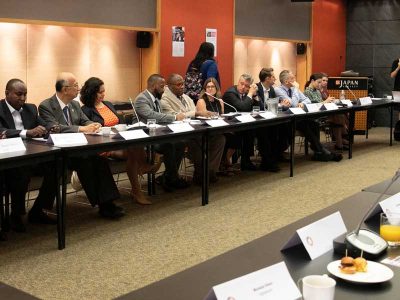Join a powerful, unprecedented alliance for better eye health for all.
Join IAPB-
Choose an alternate language here
“Accelerate”. This was the word on everyone’s lips at the 2019 High-level Political Forum (HLPF), which took place from 9-18 July at UN Headquarters in New York. Four years after the adoption of the 2030 Agenda, the consensus is that we are simply not moving fast enough.
António Guterres, UN Secretary-General, called on world leaders to “step it up” and to come to the UN meetings in September “not with beautiful speeches, but with concrete actions, plans and commitments to accelerate the implementation of the 2030 Agenda and the Paris Agreement on climate change”. This is not the time for ‘half measures or empty promises’ he said in his opening of the HLPF.
The 2019 HLPF was an important milestone as it closed the first four-year cycle of the 2030 Agenda. The last remaining six Sustainable Development Goals (SDGs), under the theme ‘empowering people and ensuring inclusiveness and equality’, were reviewed in the first week:
In addition, 47 countries presented their Voluntary National Reviews (VNRs) (seven for the second time), bringing the total number of countries to have conducted VNRs to 147.
For IAPB and our members, the HLPF was a critical opportunity to advance the issue of eye health within the context of UHC and the Political Declaration, demonstrate the links between eye health and the SDG agenda, and raise the profile of eye health as a global population health issue with and among Member States and, in doing so, contribute to the advancement of the SDGs.
The UN Friends of Vision held its fourth meeting during the Ministerial Segment of the HLPF on ‘Vision as an SDG accelerator’. The roundtable event focused on how eye health could advance Goals 4, 8 and 10. Ambassador Webson, Permanent Representative of Antigua and Barbuda to the United Nations and Chair of the Friends of Vision group, opened the event with some sobering reminders;
Jennifer Gersbeck, Director of Global Partnership and Advocacy at The Fred Hollows Foundation said “providing access to eye care to women and girl ensures equitable education, boosts women’s participation in the workforce, improves their health and reduces the likelihood of early marriage and pregnancy”.
Jennifer Gootman, Vice President of Social Consciousness & Innovation at West Elm, a furnishing retailer based Brooklyn, gave a real life example of how providing access to eye care to their factory workers in India and the Philippines boosted productivity.
Stewart Simonson, the new Head of the World Health Organization New York Office said that vision had a close place in his heart because of his experiences visiting families in rural areas afflicted with glaucoma. He committed to supporting the UN FoV’s future work.
Ambassador Bessho H.E. Mr. Koro Bessho, Permanent Representative of Japan to the United Nations said his work in disaster relief reduction had made him realise the impact of vision, noting that many of the casualties of tsunamis were people with disabilities.
Over 40 people, including Ambassadors and UN mission representatives, attended the event. We all came away feeling ready to accelerate our efforts to achieving universal eye health in the spirit of the 2030 agenda for sustainable development.
As Richard Curtis said in his keynote address, Goals “give us a unique opportunity” as they provide a target and a roadmap. And right now is the precise moment to grab this unique opportunity for eye health. The year 2020 has a special resonance across the world; it will see the end of VISION 2020 and the Global Action Plan. However, it also marks the start of the next decade of vision. We now have better data, a bigger IAPB network and soon, a World Report on Vision.

The Friends of Vision group has had a strong voice in the negotiation process for the Political Declaration. We as the IAPB network have been supporting this effort; developing set of key messages and meeting with Member State representatives from Bangladesh, Austria, Australia, New Zealand, Mexico, India, the European Union, Rwanda, Japan, Georgia and Thailand over the last 4 months.
The final draft of the Political Declaration was issued last week by the co-facilitators, Georgia and Thailand, under the “silence procedure”. The draft includes a reference to eye health at paragraph 34:
“Also strengthen efforts to address eye health conditions and oral health, as well as rare diseases and neglected tropical diseases, as part of universal health coverage;”
You can view the final draft of the Political Declaration here.
This is an important milestone as it is the first time eye health has been included in a UN Declaration. It is remarkable what the Friends of Vision group has been able to achieve in its mere 9 months of existence. The group continues to grow, with more than 50 country representatives having now attended at least one of the four meetings. Next on the group’s agenda is screening all 193 UN Ambassadors on World Sight Day, a Dine in the Dark event at the UN Headquarters with the Global Coalition on Ageing and UN DESA
…and then a UNGA Resolution – as don’t forget Goals gives us a unique opportunity.